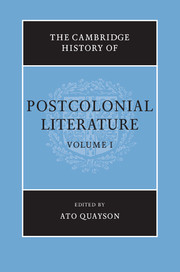Book contents
- Frontmatter
- 1 Introduction: postcolonial literature in a changing historical frame
- 2 Postcolonial fictions of slavery
- 3 Postcolonialism and travel writing
- 4 Missionary writing and postcolonialism
- 5 Postcolonial auto/biography
- 6 Orality and the genres of African postcolonial writing
- 7 Canadian literatures and the postcolonial
- 8 Postcolonialism and Caribbean literature
- 9 Postcolonialism and Arab literature
- 10 Postcolonialism and postcolonial writing in Latin America
- 11 Postcolonial writing in South Africa
- 12 Postcolonial literature in Southeast Asia
- 13 Postcolonial South Asian poetry
- 14 Postcolonial writing in India
- 15 Postcolonial writing in Australia and New Zealand
- 16 Indigenous writing in Canada, Australia and New Zealand
- 17 Postcolonial writing in Ireland
- 18 Postcolonial writing in Britain
- 19 Postcolonial writing in France
- 20 Postcolonial writing in Germany
- References
2 - Postcolonial fictions of slavery
Published online by Cambridge University Press: 28 January 2012
- Frontmatter
- 1 Introduction: postcolonial literature in a changing historical frame
- 2 Postcolonial fictions of slavery
- 3 Postcolonialism and travel writing
- 4 Missionary writing and postcolonialism
- 5 Postcolonial auto/biography
- 6 Orality and the genres of African postcolonial writing
- 7 Canadian literatures and the postcolonial
- 8 Postcolonialism and Caribbean literature
- 9 Postcolonialism and Arab literature
- 10 Postcolonialism and postcolonial writing in Latin America
- 11 Postcolonial writing in South Africa
- 12 Postcolonial literature in Southeast Asia
- 13 Postcolonial South Asian poetry
- 14 Postcolonial writing in India
- 15 Postcolonial writing in Australia and New Zealand
- 16 Indigenous writing in Canada, Australia and New Zealand
- 17 Postcolonial writing in Ireland
- 18 Postcolonial writing in Britain
- 19 Postcolonial writing in France
- 20 Postcolonial writing in Germany
- References
Summary
Fictional representations of slavery begin with texts such as Aphra Behn’s Oroonoko; or, The Royal Slave, a novella that was hugely popular in its time and widely adapted for the stage for over a century after its publication. The most recent adaptation, Biyi Bandele’s 1991 play, is an adaptation of adaptations. The Royal Shakespeare Company enlisted Nigerian-born Bandele to adapt a play based on both Restoration dramatist Thomas Southerne’s 1695 Oroonoko and John Hawkesworth’s 1759 play by the same name. These multiple layers of adaptation are no less rich than the sources Behn used for her novella. Depicting the tragedy of an African prince who, along with his beloved, is sold into New World slavery, Behn follows the slave trade back across the Atlantic to Africa, becoming the first English author to represent sub-Saharan African people in their own continent. To familiarize her readers with her characters and settings, Behn made use of the conventions of the New World travel story, the courtly romance and the heroic tragedy and, especially, the conventions of the Oriental romance, including the trope of the Noble Savage. Beyond familiarizing the foreign, Behn’s strategies helped highlight the human tragedy of the slave trade. As a heroic tragedy, Behn’s novella ‘exaggerates precisely those emotional experiences that were often suppressed by historical description, debates, and documentary records’ about the slave trade. In its various adaptations, Oroonoko became part of the abolitionist movement in England, and was eventually considered a forerunner to Harriet Beecher Stowe’s Uncle Tom’s Cabin (1852).
- Type
- Chapter
- Information
- The Cambridge History of Postcolonial Literature , pp. 30 - 57Publisher: Cambridge University PressPrint publication year: 2012



